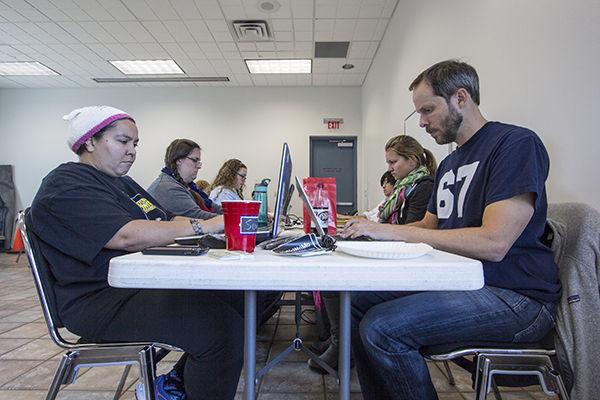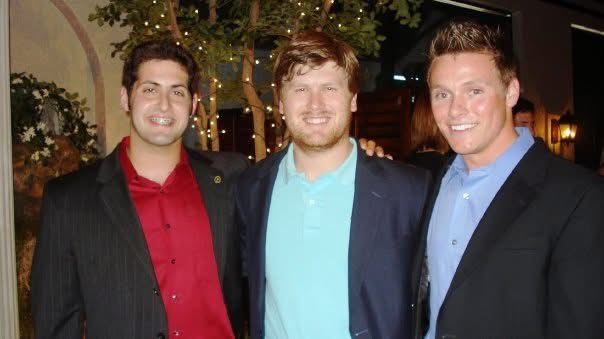National Novel Writing Month is kind of like running a marathon — find a steady pace to cross the finish line.
For writers participating in NaNoWriMo during the month of November, that pace is a word count of 1,667 words per day, finishing a grand total of 50,000 words in 30 days. The object is simple: Finish a novel in a month. In its 16th year, NaNoWriMo expects 400,000 participants.
The Bryan-College Station chapter of the national initiative kicked off Friday at Ihop, and the first official write-in took place Sunday afternoon at Larry J. Ringer Library.
Each of the 600-plus chapters is assigned a municipal liaison, ML, that facilitates the write-ins and supports the writers. Ted Boone, lecturer in the Mays Business School and one of two regional MLs, said each region’s write-ins function differently.
“The way we typically do ours is we announce that we’re going to do a 10-minute or 15-minute ‘word sprint’ or stop socializing or talking for some time and just write,” Boone said.
At the end of the “sprints,” writers count up their words written in the allotted amount of time. Boone said this creates a friendly rivalry among the writers to keep moving forward.
“It’s just a nice mix of socializing and commiserating about what might be going right or wrong and then spending time actually writing,” Boone said. “And as superficial as it seems, being in the same room with other people doing the exact same thing actually speeds up the process.”
While some participants attend every write-in, Boone said many of the approximately 100 active regional participants choose to write on their own time.
Attending organized write-ins — which last for hours at a time — is not mandatory, but it is encouraged. Boone said the MLs also encourage participants to host unofficial write-ins.
“The more the merrier,” Boone said. “The only rule that we really establish is that writers have to welcome all people. So you can’t have a write-in that’s only football fans or only A&M students. If any one wants to participate they are welcome.”
Some participants plan extensively before NaNoWriMo and others begin with just an idea.
Andrew Woodard, history senior and fourth-year NaNoWriMo participant, described himself as a “pantser.”
“I like to pretend that I prepare for it, but I’m — in NaNo lingo — I’m a pantser, which means I fly by the seat of my pants, so it’s pretty much no plan going in,” Woodard said.
Caleb Vierkant, journalism sophomore and second-year participant, said he tries to make a basic outline before going into the first write-in.
“I try to think, ‘Where do I want my character to start, where do I want my character to end? And everything else that I write is just me trying to get to that endpoint,” Vierkant said.
Woodard said the community offered by NaNoWriMo is important to him.
“It’s just a great place for finding like-minded people,” Woodward said. “There are usually niches, where if you want to talk you can sit in a certain place and if you want to get down to work you can sit in one place. There’s always somebody that’s thinking similarly to you.”
Lindsey Witt, Class of 2012, said her book was unfinished after making it to 50,000 words last year, so her goal this year is to finish the book.
“Right now I’m going through it all over again,” Witt said. “It is 128 pages. I’m on page 15. So I’m just fixing a word here, fixing a word there and once I finish editing what I wrote last year, I’m going to work on finishing it. I just need to get there.”
Boone said NaNoWriMo ends up being an intersection of interests, experience levels and genres.
“I think we’ve kind of got this perfect balance of people who are coming from different professional backgrounds or different age groups,” Boone said. “And interacting with the typical college student — that’s actually a good thing for our participants.”
For those new to the process, Boone said writing 1,667 words per day can seem daunting.
“I like to break that down and suggest most people can write roughly 400 to 500 words in 15 minutes,” Boone said. “If all they do is turn off their ‘inner editor’ and just type, that means you’re committing something like writing an hour a day, and for most people an hour seems a lot more manageable than 1,667 words.”
Woodard said there is friendly pressure to meet a certain word count during the write-ins.
“It’s usually a pressure, as you saw a few minutes ago there’s friendly competition to say, ‘Hey, where are you? Ha-ha, I’m ahead of you,’” Woodard said. “There’s pressure if you’re behind the word count, but if you know you’re behind a specific person, then that’s a little bit more pressure.”
Boone said there are days when participants write 3,000-4,000 words and others when they may write zero words.
“None of those are things you need to be worrying about,” Boone said. “You just need to continue the process and just expect that the long term goal will eventually just work itself out.”
A Novel In A Month
November 2, 2014

Cody Franklin — THE BATTALION
Ted Boone (right), lecturer in the Mays Business School, participates with NaNoWriMo members in a write-in at Larry J. Ringer Library in College Station Sunday afternoon.
0
Donate to The Battalion
$1765
$5000
Contributed
Our Goal
Your donation will support the student journalists of Texas A&M University - College Station. Your contribution will allow us to purchase equipment and cover our annual website hosting costs, in addition to paying freelance staffers for their work, travel costs for coverage and more!
More to Discover









